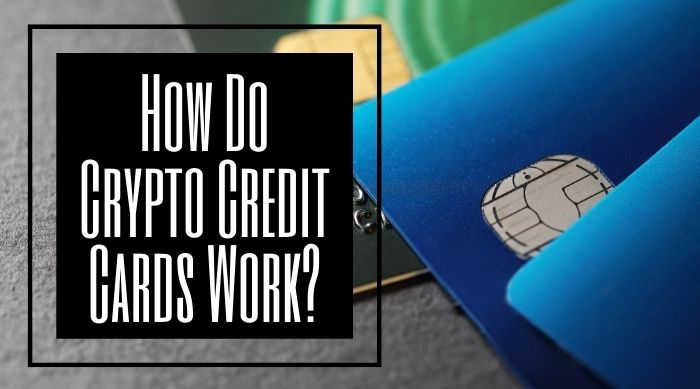How do crypto credit cards work? If you’re searching for a credit card that allows you to pay for goods and services in Bitcoin or Ethereum, you may be disappointed since most retailers aren’t accepting those currencies as payment.

But if you want a card that pays rewards in cryptocurrency, you’ll find a number of options that may appeal to you. Some may be more generous than others, and some may offer support for multiple coins or currencies while others may have a more limited set of options for how your rewards may be paid.
How Do Crypto Credit Cards Work?
A traditional credit card rewards program may offer you cash back, frequent flyer miles, discounts on hotels or other travel-related expenses, or other perks. Crypto cards may offer rewards that are similar to these, but redeeming them may be trickier than for traditional miles, points, or cash back.
A crypto credit card may, like its more traditional counterparts, be offered as an installment credit card or revolving credit. Whether the card features monthly payments like a Mastercard or Visa, or requires you to pay the balance in full each month, there may be rewards offered for certain spending levels, consistent on-time payments, or even for shopping with partner vendors.
The cryptocurrency angle isn’t related to purchasing most of the time but rather applies when credit card rewards are issued–the “crypto” in the term crypto credit card refers to the perk for spending, rather than spending crypto itself with the card.
Some types of credit card programs, including the SoFi credit card, allow you to redeem rewards in either fiat currency (real world money) or crypto. In April 2021, SoFi announced the option to redeem rewards in crypto, but their press release raised an important question.
Claiming Rewards
How do you claim your rewards in Bitcoin or any other supported cryptocurrency if you cannot spend the coins at the same retailer you make your fiat currency purchases with?
That will depend greatly on the card, but in the case of the SoFi crypto rewards option, customers were allowed to redeem their crypto rewards via the SoFi Invest platform. SoFi may allow you to redeem your credit card rewards for debt repayment, deposits, or investments in addition to redeeming for crypto.
So while in this case it isn’t as simple as an in-real-life rewards cash out for airmiles or other perks, it can be a way to start or continue investing in cryptocurrency using the rewards as your investment funds.
Other crypto cards seem a bit stingier in their rewards. For example, the Upgrade Bitcoin Rewards Visa offers perks in Bitcoin only, and you cannot transfer your rewards to your own wallet so you have the option to hold your Bitcoin or sell it.
If you do sell, Upgrade takes a 1.5% transaction fee. The fine print of the Upgrade official site says of this program that the proceeds you get from selling Bitcoin “…are redeemable only in the form of statement credit.” As you can see, not all crypto credit cards are created with the same quality of perks.
Regulatory Issues
One crypto credit card is noteworthy for the trouble it caused with the Securities And Exchange Commission (SEC); the BlockFi Rewards Visa Signature Card offers crypto rewards payable in up to 10 different types of currency, and allows you to transfer crypto rewards off the BlockFi platform and into your own crypto wallet.
So far so good, but it’s the next perk that caused the trouble with the SEC; at one time this card offered you the ability to earn interest on your rewards if you held those rewards in a BlockFi Interest Account or BIA. But the SEC ruled that BIAs are considered securities and are subject to federal regulation.
In this case, the lender failed to register the rewards offers and the sales of BIAs, and it failed to qualify for an exemption from registering. The fallout from that is that the SEC ruled BlockFi “operated for more than 18 months as an unregistered investment company because it issued securities,” according to an SEC press release.
What does this mean for the future of crypto credit cards? Basically, any cryptocurrency operation that offers a feature that resembles a federally regulated investment instrument is subject to the rule of federal law.
The SEC Wants To Help Crypto Credit Card Companies?
The SEC Chair went on the record in the press release mentioned above stating the agency has a “willingness to work” with crypto companies to help them get into or remain in compliance with these laws, where applicable. But the writing is on the wall in terms of how far crypto platforms can push the boundaries in this area.
Why do we mention these legal issues here? Because with traditional credit card rewards programs your rewards may tend to be the kind that are best left to accumulate over time until you want to spend them.
If you want to hang on to crypto rewards over a longer period of time, those rewards aren’t as secure as you think they are.
What happens if the SEC decides one aspect of the rewards program you belong to simply does not comply with federal law and is arbitrarily eliminated? Do your rewards get converted into something else or do you just lose them?
The reason we can’t answer this question with any certainty is because a traditional credit card program has to comply with federal law and that compliance is mandatory. But in the wild west of cryptocurrency where regulatory oversight is simply not happening, the big question is “How much longer can they get away with that?”
What To Know About Crypto Credit Cards
What we’ve discussed here has been fairly limited to the types of rewards you might earn in crypto when using a crypto credit card. But there are other things to consider besides the perks. You will want to know the APR of the card, which is not just the interest rate but rather that rate plus the cost of any other fees associated with your credit account.
You will want to know the perks offered and how they compare to any applicable annual fee for the card. How much is the interest rate and does it vary? Under what conditions? If you miss a payment, does a different interest rate begin? If so, for how long?
And when it comes to your crypto perks, you’ll want to consider the current “exchange rate” for the crypto rewards you get. Because crypto is volatile, your rewards may not be worth the same tomorrow as they were yesterday. That is an important factor when trying to decide whether to earn and hold your rewards, or use them as they come in.
Check The Crypto Fees
It’s important to remember that you will be subject to more than one type of fee when you use your crypto credit card and its rewards. For example, in addition to any annual fee you pay to use the card, will you be subject to a transaction fee for selling the crypto you earn? How much is that fee and how does that cut into the amount of rewards you have earned?
Another aspect of earning crypto perks to be mindful of? The tax implications of those rewards. Ordinary credit card rewards aren’t taxable (under certain conditions), but that’s because they are not considered income or property.
Tax Implications
Cryptocurrency is not regulated as property and not as income, but since it IS regulated by the IRS in this way, you may be on the hook for federal taxes. Not necessarily just for owning and holding the crypto; the IRS official site says the “taxable event” that triggers your tax liability happens when you sell or exchange virtual currencies.
You will need to show the IRS that you had either a gain or a loss as the result of selling or exchanging crypto. Tax laws change frequently and the information current today could easily be outdated tomorrow.
If you own crypto, it’s best to consult a tax professional or speak with an IRS representative to learn what your rights and responsibilities are for reporting your crypto holdings on your federal taxes.
The Bottom Line
The two biggest variables to consider when you weigh your options for crypto credit cards are regulation and the value of the cryptocurrency you’re trying to earn. Today’s regulatory environment may not be the same tomorrow and your crypto holdings and rewards could definitely be affected by future federal laws.
Will changes in the law affect your card’s program in ways that could lower the value of your rewards? Will changes in the floor price of a certain currency affect the value instead? Or both at once?
In addition to checking out the fees, terms and conditions, and APRs of the crypto cards you’re comparing, you’ll also want to review the rewards programs. Are they closer to “too good to be true” than other, more traditional programs? If a card charges you excessive fees to convert or transfer your rewards, the value of such bonuses might not be as high as you’d like.
Joe Wallace has covered real estate and financial topics, including crypto and NFTs since 1995. His work has appeared on Veteran.com, The Pentagon Channel, ABC and many print and online publications. Joe is a 13-year veteran of the United States Air Force and a former reporter for Air Force Television News.


